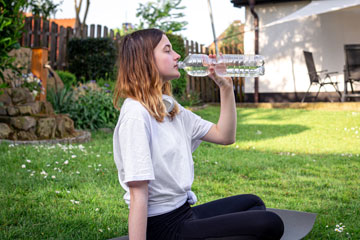As the sun shines brightly and temperatures soar, the summer season warmly welcomes us with its vibrant energy. While this time of the year brings joy and ample opportunities for outdoor activities, it also presents unique health challenges that require our attention and care. Compared to other seasons, summer can be particularly demanding and unforgiving. The scorching heat, coupled with sweat, rashes, and sunburn, can disrupt our daily routines and hinder our efforts to stay fit and active. To fully embrace the beauty of summer while remaining refreshed and invigorated, prioritizing our well-being is crucial. Here are some health tips for summer to keep you safe and well during the hot weather –
- Stay Hydrated – It is extremely important to remain hydrated at all times, but this is critical during summer, especially when spending time outdoors. Be sure to drink plenty of healthy fluids throughout the day to stay hydrated. Dehydration can lead to fatigue, dizziness, and other health problems. If you are going outside for an extended period of time, carry a water bottle with you and sip water regularly. Drinking eight glasses of water a day is the standard recommendation, but since very hot or humid weather can make you sweat, it requires additional fluid.
- Wear Sunscreen – Protect your skin from harmful UV rays by applying sunscreen with a high SPF before stepping outside. Reapply it every two hours, especially if you sweat or are swimming. Use sunscreen with a minimum SPF of 30.
- Limit Outdoor Activities during Peak Hours – Try to remain indoors during the hottest parts of the day, typically from 10 am to 4 pm. The sun’s rays are the harshest during this time range. Too much sun exposure can cause several skin problems, including skin cancer. However, if you need to go outside, seek shade and take frequent breaks.
- Dress Appropriately – Wear lightweight, loose-fitting, and light-coloured clothing to help your body stay cool. Avoid dark-colored clothes as they absorb more heat. To reduce sun damage, cover the parts of your body which are exposed to the sun.
- Eat Light and Fresh – Maintain a balanced diet with plenty of fruits, vegetables, and salads. Eating fresh fruits and vegetables will boost your immune system. These foods contain a high water content and provide essential nutrients like iron, magnesium and calcium to keep you energized. They are also great sources of folates and are easy to digest if properly cleaned and cooked. In addition, eat greens every day to regulate healthy body temperature and keep your weight under control.
- Avoid Sugary and Alcoholic Beverages – Beverages like soda, energy drinks, and alcohol can contribute to dehydration. Drink water and natural fruit juices instead.
- Exercise Mindfully – Summer is the perfect time to enjoy outdoor activities with family and friends. Exercise early in the morning or later in the evening when it is cooler outside. Go for a hike, ride your bike, play tag, and engage in fun activities. However, keep in mind that the amount of exercise you need depends on your age and health. To reduce the risk of heat-related illnesses, avoid intense workouts during the peak heat of the day.
- Protect your Eyes -Wear sunglasses with UV protection to shield your eyes from the sun’s harmful rays. This will help prevent eye strain and potential damage.
- Sleep well – Ensure you get enough sleep to help your body recover and rejuvenate.
- Watch for Signs of Heat-related Illness – Be aware of symptoms like heat exhaustion (heavy sweating, weakness, dizziness) and heatstroke (high body temperature, confusion, and loss of consciousness). Seek medical attention immediately if you or someone else shows signs of heatstroke.
- Follow the CEM rule – Follow the golden rule of skin care – cleanse, exfoliate and moisturise (CEM). The rising temperatures can trigger skin issues such as dry patches, sun rashes, sunburn and hyperpigmentation. The extreme heat may also cause excessive oil production and breakouts. So, don’t neglect your skin. Cleansing removes the top layer of dirt, pollution and oil. Exfoliation helps remove the layer of dead skin cells and helps skincare items penetrate better. Moisturising hydrates the skin and keeps it plump.
- Be Cautious with Food – Summer is the peak time for foodborne illnesses. During outdoor events or picnics, avoid leaving perishable foods out in the heat for more than two hours. Keep food properly refrigerated or in coolers with ice.
It is important to remember that each person’s tolerance level to heat may vary. Listen to your body and take the necessary precautions to stay healthy and refreshed during the summer months.

